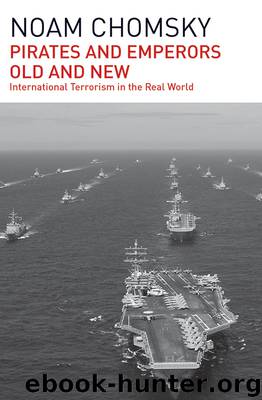Pirates and Emperors, Old and New by Chomsky Noam

Author:Chomsky, Noam
Language: eng
Format: epub
Tags: Political Science, History
ISBN: 978-1-60846-442-5
Publisher: Haymarket Books
Published: 2015-04-07T16:00:00+00:00
5
International Terrorism: Image and Reality (1989)
There are two ways to approach the study of terrorism. One may adopt a literal approach, taking the topic seriously, or a propagandistic approach, construing the concept of terrorism as a weapon to be exploited in the service of some system of power. In each case it is clear how to proceed. Pursuing the literal approach, we begin by determining what constitutes terrorism. We then seek instances of the phenomenon—concentrating on the major examples, if we are serious—and try to determine causes and remedies. The propagandistic approach dictates a different course. We begin with the thesis that terrorism is the responsibility of some officially designated enemy. We then designate terrorist acts as “terrorist” just in case they can be attributed (whether plausibly or not) to the required source; otherwise they are to be ignored, suppressed or termed “retaliation” or “self-defense.”
It comes as no surprise that the propagandistic approach is adopted by governments generally, and by their instruments in totalitarian states. More interesting is the fact that the same is largely true of the media and scholarship on terror in the Western industrial democracies, as has been documented in extensive detail.1
“We must recognise,” Michael Stohl observes, “that by convention—and it must be emphasised only by convention—great power use and the threat of the use of force is normally described as coercive diplomacy and not as a form of terrorism,” though it commonly involves “the threat and often the use of violence for what would be described as terroristic purposes were it not great powers who were pursuing the very same tactic.”2 Only one qualification must be added: the term “great powers” is restricted to favored states; in the Western conventions under discussion here, the Soviet Union is granted no such rhetorical license, and indeed can be charged and convicted on the flimsiest evidence, the mirror-image of Soviet practice.
Terrorism became a major public issue in the 1980s. The Reagan Administration took office announcing its dedication to stamp out what the president called “the evil scourge of terrorism,” a plague spread by “depraved opponents of civilization itself” in “a return to barbarism in the modern age” (Secretary of State George Shultz). The campaign focused on a particularly virulent form of the plague: state-directed international terrorism. The central thesis attributed responsibility to a Soviet-based “worldwide terror network aimed at the destabilization of Western democratic society,” in the words of Claire Sterling, whose highly praised book The Terror Network became the Bible of the Administration and the founding document of the new discipline of terrorology. It was taken to have provided “ample evidence” that terrorism occurs “almost exclusively in democratic or relatively democratic societies” (Walter Laqueur), leaving little doubt about the origins of the plague. The book was soon exposed as a worthless propaganda tract, but the thesis remained intact, dominating mainstream reporting, commentary and scholarship.
Concern over international terrorism peaked in the mid-1980s. Mideast/Mediterranean terrorism was selected by editors as the lead story of 1985 in an Associated Press poll,
Download
This site does not store any files on its server. We only index and link to content provided by other sites. Please contact the content providers to delete copyright contents if any and email us, we'll remove relevant links or contents immediately.
| Arms Control | Diplomacy |
| Security | Trades & Tariffs |
| Treaties | African |
| Asian | Australian & Oceanian |
| Canadian | Caribbean & Latin American |
| European | Middle Eastern |
| Russian & Former Soviet Union |
The Secret History by Donna Tartt(19088)
The Social Justice Warrior Handbook by Lisa De Pasquale(12190)
Thirteen Reasons Why by Jay Asher(8910)
This Is How You Lose Her by Junot Diaz(6887)
Weapons of Math Destruction by Cathy O'Neil(6280)
Zero to One by Peter Thiel(5802)
Beartown by Fredrik Backman(5754)
The Myth of the Strong Leader by Archie Brown(5507)
The Fire Next Time by James Baldwin(5446)
How Democracies Die by Steven Levitsky & Daniel Ziblatt(5219)
Promise Me, Dad by Joe Biden(5153)
Stone's Rules by Roger Stone(5088)
A Higher Loyalty: Truth, Lies, and Leadership by James Comey(4964)
100 Deadly Skills by Clint Emerson(4925)
Rise and Kill First by Ronen Bergman(4789)
Secrecy World by Jake Bernstein(4753)
The David Icke Guide to the Global Conspiracy (and how to end it) by David Icke(4720)
The Farm by Tom Rob Smith(4513)
The Doomsday Machine by Daniel Ellsberg(4490)
